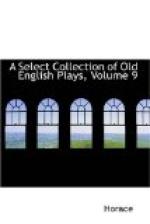FINIS.
FOOTNOTES:
[1] Baldwin’s “Old English Drama,” 2 vols. 12mo.
[2] From the similarity of the names, it seems the author originally intended to make Young Lusam the son of Old Lusam and brother of Mistress Arthur, but afterwards changed his intention: in page 13 the latter calls him a stranger to her, although he is the intimate friend of her husband.
[3] [Old copy, walk.]
[4] Busk-point, the lace with its tag which secured the end of the busk, a piece of wood or whalebone worn by women in front of the stays to keep them straight.
[5] [Old copies, Study.]
[6] [Old copy, watch.]
[7] [Old copies, dream.]
[8] [All Fuller’s speeches must be supposed to be Asides.]
[9] [Old copies give this line to Fuller.]
[10] Old copies, she.
[11] Old copies, bene; but the schoolmaster is made to blunder, so that bene may, after all, be what the author wrote.
[12] The rod, made of a willow-wand.
[13] Old copy, how.
[14] [Old copies, laid.]
[15] [A quotation.]
[16] Christ-cross, the alphabet.
[17] [The sense appears to be, for this not being perfect poison, as his (the pedant’s) meaning is to poison himself, some covetous slave will sell him real poison.]
[18] [Old copies, seem’d.]
[19] [Old copies, First.]
[20] [Massinger, in his “City Madam,” 1658, uses this word in the sense of above the law. Perhaps Young Arthur may intend to distinguish between a civil and religious contract.]
[21] [See Hazlitt’s “Proverbs,” 1869, p. 90.]
[22] [i.e., The hoar-frost.]
[23] [Old copy, flies upon.]
[24] [This line has been seriously corrupted, and it might be impossible to restore the true reading. The old copies have: Ask, he knew me, a means, &c.]
[25] [Having, however, been written and acted some years before it was printed in 1606.]
[26] Sloughing hotcockles is a sport still retained among children. The diversion is of long standing, having been in use with the ancients. See Pollux, lib. ix. In the copy it is spelt slauging.
[27] Old copy, which.
[28] [So in Wybarne’s “New Age of Old Names,” 1609, p. 12: “But stay, my friend: Let it be first manifest that my Father left Land, and then we will rather agree at home, then suffer the Butler’s Boxe to winne all.” The phrase occurs again in “Ram Alley,” 1611.]
[29] [So the old copy, and rightly. Forne is a contracted form of beforne, a good old English word. Hawkins printed fore.]
[30] Query, if this be not a fling at Shakespeare? See “Cymbeline.” —Hawkins. [Scarcely, for there are two sons recovered in that play, and the incident of finding a long-lost child is not an uncommon one in the drama. We have a daughter thus found in Pericles.—Ebsworth.]




